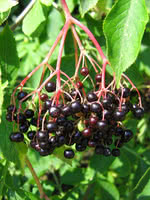Mon-Fri 9am - 5pm Mountain time
Wild Snowberry vs Black Elderberry
Symphoricarpos spp.
Sambucus canadensis
CUSTOM GROW
NOT AVAILABLE THIS SEASON - MIGHT RETURN
Wild Snowberry is a mix of Common Snowberry and Western Snowberry. Each shrub's size, flower, and berry colour may vary.
This plant is abundant across the prairies. It can be planted alone or as a hedge in small yards. This shrub's ornamental berries persist into winter. Wild Snowberry can be a natural habitat and food source for various animals.
Black Elderberry is a deciduous shrub native to eastern North America. You can plant this shrub in moist areas and it will help stabilize your soil. You can also use it on rural properties anywhere you'd use a lilac.
Black Elderberries are considered to be partially self-pollinating. So while they will still produce some berries without cross-pollination, planting with another variety will increase yields. Consider planting with Ranch Elderberry or Bob Gordon Elderberry.
Warning: the seeds, stems, leaves, roots, and uncooked berries of the Black Elderberry are poisonous to humans when eaten in quantity. You should cook the berries to make them safe for human consumption.
Wild Snowberry Quick Facts
Black Elderberry Quick Facts
Toxicity: leaves, stems, and uncooked berries are poisonous to humans

